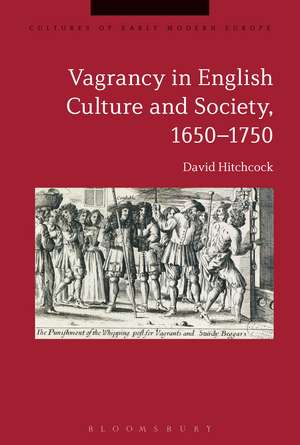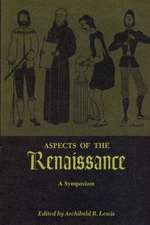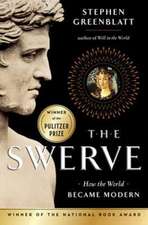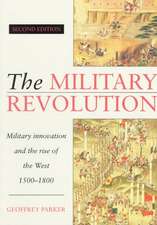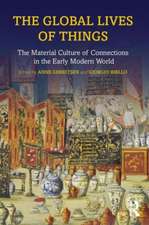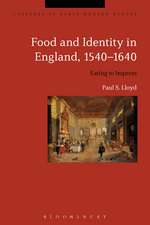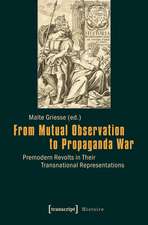Vagrancy in English Culture and Society, 1650-1750: Cultures of Early Modern Europe
Autor Dr David Hitchcock Beat Kümin, Professor Brian Cowanen Limba Engleză Paperback – 24 ian 2018
| Toate formatele și edițiile | Preț | Express |
|---|---|---|
| Paperback (1) | 237.57 lei 6-8 săpt. | |
| Bloomsbury Publishing – 24 ian 2018 | 237.57 lei 6-8 săpt. | |
| Hardback (1) | 773.39 lei 6-8 săpt. | |
| Bloomsbury Publishing – 13 iul 2016 | 773.39 lei 6-8 săpt. |
Preț: 237.57 lei
Preț vechi: 272.69 lei
-13% Nou
Puncte Express: 356
Preț estimativ în valută:
45.47€ • 47.29$ • 37.53£
45.47€ • 47.29$ • 37.53£
Carte tipărită la comandă
Livrare economică 15-29 aprilie
Preluare comenzi: 021 569.72.76
Specificații
ISBN-13: 9781350058125
ISBN-10: 1350058122
Pagini: 248
Ilustrații: 10 bw illus
Greutate: 0.35 kg
Ediția:NIPPOD
Editura: Bloomsbury Publishing
Colecția Bloomsbury Academic
Seria Cultures of Early Modern Europe
Locul publicării:London, United Kingdom
ISBN-10: 1350058122
Pagini: 248
Ilustrații: 10 bw illus
Greutate: 0.35 kg
Ediția:NIPPOD
Editura: Bloomsbury Publishing
Colecția Bloomsbury Academic
Seria Cultures of Early Modern Europe
Locul publicării:London, United Kingdom
Caracteristici
Blends social and cultural history, weaving the experience of vagrancy together with perceptions of and responses to it
Notă biografică
David Hitchcock is Lecturer in History at Canterbury Christ Church University, UK.
Cuprins
Introduction: Sticks, Stones, Broken Bones1. The Assumption of Idleness: Definitions of and Responses to Vagrancy in England2. 'Rogue Ballads' and Popular Perceptions of Vagrancy3. 'Rogue's Redemption': Vagrancy, Marginalisation and Escape in English Literature4. The Hidden Histories of the Mobile Poor: Casual Relief and Roadside Subsistence5. Masterless Women: Domestic Service and Female Subsistence MobilityConclusions: The Pillory and the Whipping PostBibliographyIndex
Recenzii
Hitchcock (Canterbury Christ Church Univ., UK) provides the first substantial investigation of vagrancy in English culture and society from 1650 to 1750, building on the groundbreaking scholarship of A.L. Beier, who examined rootlessness in England during the century previous (Masterless Men: The Vagrancy Problem in England 1560-1640, 1985). Hitchcock is to be commended for giving vivid voice to the most marginal and historically ephemeral of human populations. His work offers a highly readable and marvelously constructed social and cultural analysis of vagrancy grounded on a rich source base of royal proclamations, newspapers, pamphlets, court records, constabulary accounts, and popular ballads. The first half of the monograph explores the cultural construction of the vagrant, while the second gives a social history of vagrancy and subsistence mobility. Along the way, Hitchcock challenges a number of historiographic assumptions, namely, that contemporaries made clear-cut distinctions between vagrants and poor migrants; that English vagrancy declined in the decades following 1662; and that men constituted the vast body of vagrants in early modern England. This well-organized, highly accessible account will be of interest to all students of early modern culture, society, and gender. Summing Up: Highly recommended. All levels/libraries.
Hitchcock offers a distinctive take on early modern vagrancy, downplaying the emphasis in much existing historiography on demography and highlighting the need to consider both local social dynamics and the importance of printed discourse in more depth.
This study makes a striking contribution to early modern social history.
Focusing on the century after the civil wars, David Hitchcock's book fills a significant gap in the literature, exploring the relationship between legal and literary representations of the vagrant and the social reality revealed in judicial records and constables' accounts. Vagrancy remained a significant issue, with a prominent gender dimension, yet Hitchcock emphasises how fluid was the boundary that separated the 'vagrant' from the legitimate 'poor traveller'. Combining quantitative evidence with poignant human stories, and vigorously argued, his book marks a significance advance in the field.
This book opens up new territory in the history of vagrancy. It is based upon a firm grasp of literary and archival source materials in England and North America. The upshot is an informed, thorough and thoughtful re-examination. In particular, the author argues for a re-thinking of the chronology of the problem, because previous authorities thought the period saw a diminution in its gravity. The author is a product of the "Warwick" school of social history, which emphasizes the cultural contexts of its subjects. It is a highly readable text and a fine example of the Warwick school.
This is an easily readable, thoroughly stimulating study.
Hitchcock offers a distinctive take on early modern vagrancy, downplaying the emphasis in much existing historiography on demography and highlighting the need to consider both local social dynamics and the importance of printed discourse in more depth.
This study makes a striking contribution to early modern social history.
Focusing on the century after the civil wars, David Hitchcock's book fills a significant gap in the literature, exploring the relationship between legal and literary representations of the vagrant and the social reality revealed in judicial records and constables' accounts. Vagrancy remained a significant issue, with a prominent gender dimension, yet Hitchcock emphasises how fluid was the boundary that separated the 'vagrant' from the legitimate 'poor traveller'. Combining quantitative evidence with poignant human stories, and vigorously argued, his book marks a significance advance in the field.
This book opens up new territory in the history of vagrancy. It is based upon a firm grasp of literary and archival source materials in England and North America. The upshot is an informed, thorough and thoughtful re-examination. In particular, the author argues for a re-thinking of the chronology of the problem, because previous authorities thought the period saw a diminution in its gravity. The author is a product of the "Warwick" school of social history, which emphasizes the cultural contexts of its subjects. It is a highly readable text and a fine example of the Warwick school.
This is an easily readable, thoroughly stimulating study.
